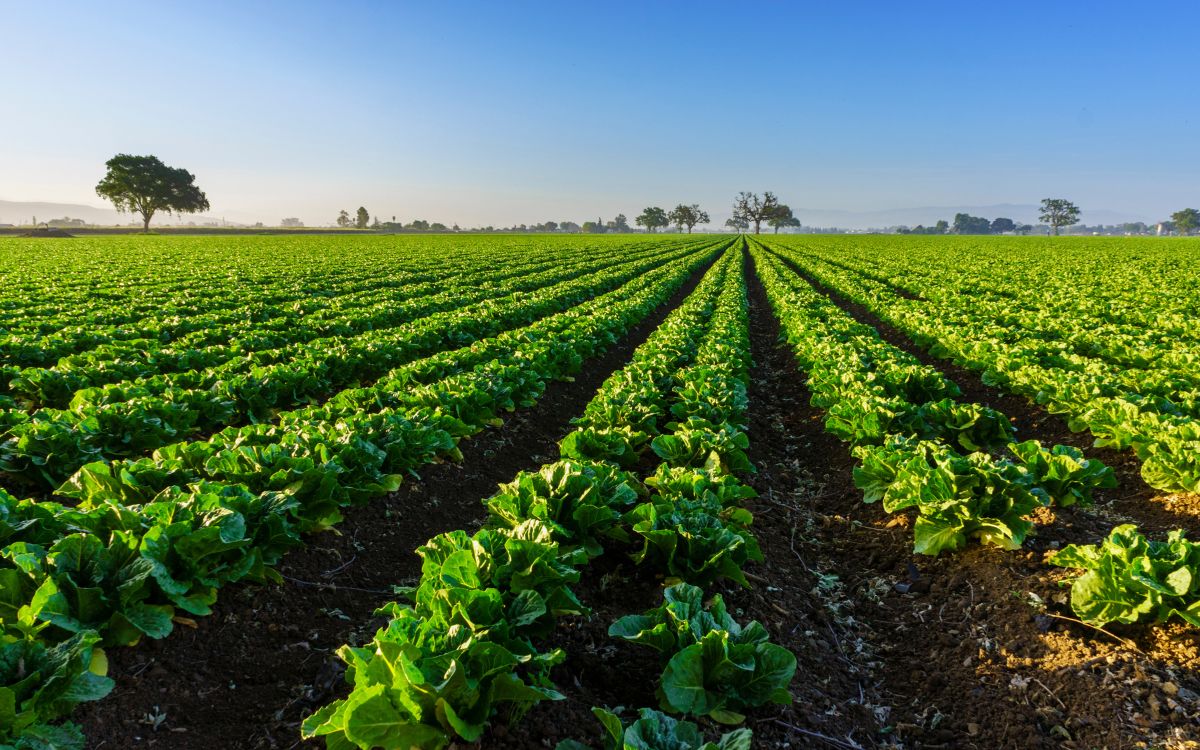In a world where environmental conservation and food security are paramount, organic farming emerges as a vital solution. By embracing organic practices, farmers can promote ecological balance, ensure food safety, support biodiversity, and improve the overall well-being of individuals.

In this article, we will delve into the various ways organic farming contributes to sustainable food production, highlighting its profound impact on our planet and its significance for future generations.
Environmental Conservation through Organic Farming
Reduction of Chemical Inputs
One of the key contributions of organic farming to sustainable food production lies in its reduction of chemical inputs. Unlike conventional farming methods that rely heavily on synthetic pesticides and fertilizers, organic farming emphasizes natural approaches to pest and weed control.
By avoiding the use of synthetic chemicals, organic farmers minimize the negative impact on soil and water quality, reducing pollution and preserving the overall health of ecosystems.
Preservation of Natural Resources
Organic farming also plays a crucial role in the preservation of natural resources. Through the adoption of organic practices, farmers actively contribute to the conservation of biodiversity and the protection of ecosystems.
Organic farms often prioritize the establishment of diverse habitats, including hedgerows and buffer zones, which support a wide array of plant and animal species. By preserving natural habitats, organic farming helps maintain the delicate balance of ecosystems and promotes the overall resilience of the environment.
Moreover, organic farming practices such as composting and cover cropping contribute to the conservation of soil. Organic matter, such as crop residues and manure, is used to build nutrient-rich compost, which not only enhances soil fertility but also aids in carbon sequestration.
By improving soil organic matter content, organic farmers promote long-term soil health, reduce erosion, and enhance the soil’s ability to retain water, mitigating the effects of drought and improving overall water conservation.
Promotion of Regenerative Practices
In addition to reducing chemical inputs and preserving natural resources, organic farming promotes regenerative practices that contribute to environmental conservation. Soil conservation is a key focus of organic farming, as it helps prevent erosion and maintains the structure and health of the soil. Organic farmers employ techniques such as contour plowing, terracing, and strip cropping to minimize erosion and promote sustainable land management.
Water conservation is another important aspect of organic farming. By utilizing efficient irrigation methods and practicing water-saving techniques, such as drip irrigation and rainwater harvesting, organic farmers minimize water wastage and ensure optimal utilization of this precious resource. Such practices not only conserve water but also contribute to the overall sustainability of agriculture, particularly in areas facing water scarcity.
Enhancing Soil Health in Organic Farming
Importance of Soil Health
Soil health is a fundamental aspect of sustainable agriculture, and organic farming places great emphasis on nurturing and enhancing the health of the soil. Healthy soil is crucial for nutrient cycling, promoting the growth of robust and nutritious crops, as well as for preventing soil erosion and maintaining the overall stability of agricultural systems.
Organic Matter and Carbon Sequestration
Organic farming practices prioritize the addition of organic matter to the soil, which plays a vital role in enhancing soil health. Farmers often employ techniques such as composting and the use of cover crops to increase organic matter content.
Composting involves the decomposition of organic materials, such as plant residues and animal manure, which are then incorporated into the soil. This process enriches the soil with nutrients, improves its structure, and enhances its water-holding capacity.
The addition of organic matter also contributes to carbon sequestration, a process by which carbon dioxide is captured from the atmosphere and stored in the soil. As organic matter decomposes, it releases carbon into the soil, helping to mitigate climate change by reducing greenhouse gas emissions.
Microbial Activity and Biodiversity
Organic farming practices support the proliferation of beneficial microorganisms and promote soil biodiversity. These microorganisms play a vital role in enhancing soil health by aiding in nutrient cycling, suppressing plant diseases, and improving nutrient availability for plants.
Organic farmers often employ techniques such as the use of compost tea or microbial inoculants to introduce beneficial microorganisms into the soil, fostering a thriving microbial community.
Furthermore, organic farming practices encourage biodiversity within the soil ecosystem. By avoiding the use of synthetic pesticides and fertilizers, organic farmers preserve the natural balance of soil-dwelling organisms, including earthworms, beneficial insects, and microorganisms.
This biodiversity contributes to the overall health and resilience of the soil, as these organisms assist in nutrient cycling, decomposition, and the suppression of harmful pests and diseases.
Ensuring Food Safety and Quality
Limiting Chemical Residues
One of the primary concerns for consumers is the presence of chemical residues in their food. Organic farming provides a solution to this concern by avoiding the use of synthetic pesticides and fertilizers.
Organic regulations and certification standards require that organic farmers adhere to strict guidelines, ensuring that their produce is free from harmful chemical residues. By choosing organic products, consumers can have peace of mind knowing that their food has been produced using natural and organic methods, reducing their exposure to potentially harmful substances.
Avoidance of Genetically Modified Organisms (GMOs)
Another aspect that sets organic farming apart is its avoidance of genetically modified organisms (GMOs). Organic farming prohibits the use of genetically modified seeds or crops, maintaining the integrity of natural genetic diversity.
This is important for preserving biodiversity and protecting traditional and heirloom varieties, which often possess unique characteristics and flavors. By choosing organic products, consumers can support the conservation of natural genetic diversity and have the assurance that their food has not been genetically modified.
Benefits for Human Health
Organic farming offers numerous benefits for human health. Studies have shown that organic produce tends to have higher nutrient content compared to conventionally grown counterparts. Organic fruits and vegetables are often found to have higher levels of certain vitamins, minerals, and antioxidants, which are essential for maintaining optimal health.
Additionally, organic farming practices that avoid the use of antibiotics and growth hormones in livestock production contribute to the production of meat and dairy products that are free from these potentially harmful substances.
Furthermore, the avoidance of synthetic pesticides and fertilizers in organic farming reduces the risk of pesticide exposure for farmers, farmworkers, and consumers. Pesticide residues have been linked to various health concerns, including developmental issues in children, hormone disruption, and increased risk of certain diseases.
By choosing organic products, individuals can reduce their exposure to these potential health risks and make a positive impact on their overall well-being.
Supporting Biodiversity through Organic Farming
Preserving Natural Habitats
One of the key contributions of organic farming to biodiversity conservation is the preservation of natural habitats within and around farms. Organic farmers often establish hedgerows, buffer zones, and wildflower strips, creating diverse and favorable environments for a wide range of plant and animal species.
These habitats serve as refuge and breeding grounds for beneficial insects, birds, and other wildlife, promoting biodiversity within the agricultural landscape. By preserving natural habitats, organic farming helps maintain ecological balance and supports the survival of diverse species.
Protection of Pollinators
Pollinators, such as bees, butterflies, and other insects, play a critical role in the pollination of crops and the maintenance of healthy ecosystems. Organic farming practices support the protection and well-being of pollinators. By avoiding the use of synthetic pesticides that can harm or kill pollinators, organic farmers provide a safer environment for these important creatures.
Furthermore, organic farms often create pollinator-friendly habitats by planting nectar-rich flowers and providing suitable nesting sites. These practices contribute to the conservation of pollinator populations, ensuring the pollination of crops and the preservation of biodiversity.
Conservation of Heirloom and Traditional Varieties
Organic farming also supports the conservation of heirloom and traditional crop varieties. These varieties often possess unique characteristics and genetic diversity, making them valuable resources for future crop breeding and adaptation.
Organic farmers prioritize the cultivation and preservation of these traditional varieties, helping to maintain genetic diversity within the agricultural system. By choosing to grow and consume organic products, individuals contribute to the conservation of these heirloom varieties and the preservation of our agricultural heritage.
The Holistic Benefits of Organic Farming
Improved Animal Welfare
Organic farming practices prioritize the well-being of animals, particularly in organic livestock production. Organic standards require that animals have access to outdoor spaces and pasture, allowing them to engage in natural behaviors and enjoy a higher quality of life.
Organic farmers avoid the use of growth hormones and antibiotics, instead opting for preventive measures and natural remedies to maintain animal health. By choosing organic animal products, consumers can support ethical and sustainable farming practices that prioritize animal welfare.
Benefits for Rural Communities
Organic farming offers numerous benefits for rural communities. By embracing organic practices, small-scale farmers have the opportunity to diversify their production, increase market access, and improve their economic viability.
Organic farming often promotes local and sustainable food systems, fostering connections between farmers and consumers within a community. This, in turn, strengthens local economies, promotes food security, and enhances the overall resilience of rural communities.
Consumer Choice and Demand for Organic Products
The increasing demand for organic products reflects a growing consumer consciousness about the importance of sustainable and environmentally friendly practices. As more individuals choose organic products, they contribute to the growth of the organic market and the expansion of organic farming.
This, in turn, encourages more farmers to transition to organic practices, leading to a positive cycle of sustainability. By supporting organic farming through their choices, consumers play a crucial role in driving the adoption of sustainable agricultural practices and promoting a healthier planet.
Conclusion
In conclusion, organic farming stands as a beacon of hope in the pursuit of sustainable food production. Through its commitment to environmental conservation, enhancement of soil health, assurance of food safety, support for biodiversity, and holistic benefits for individuals and communities, organic farming has proven its worth. As consumers, we have the power to drive change by choosing organic products, supporting local farmers, and advocating for sustainable agricultural practices.









